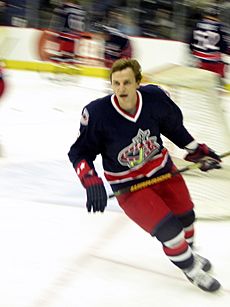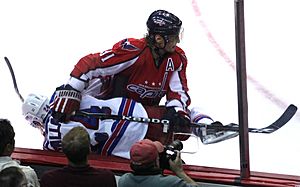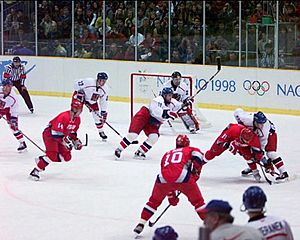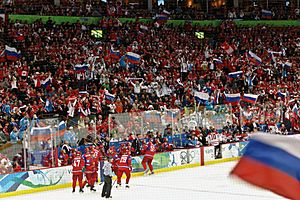Sergei Fedorov facts for kids
Quick facts for kids Sergei Fedorov |
|||||||||||||||||||||||||||||||||||||||||||||||||||||||
|---|---|---|---|---|---|---|---|---|---|---|---|---|---|---|---|---|---|---|---|---|---|---|---|---|---|---|---|---|---|---|---|---|---|---|---|---|---|---|---|---|---|---|---|---|---|---|---|---|---|---|---|---|---|---|---|
| Hockey Hall of Fame, 2015 | |||||||||||||||||||||||||||||||||||||||||||||||||||||||
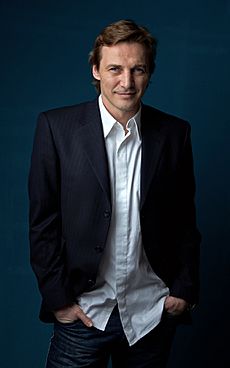
Fedorov in 2010
|
|||||||||||||||||||||||||||||||||||||||||||||||||||||||
| Born | December 13, 1969 Pskov, Russian SFSR, Soviet Union |
||||||||||||||||||||||||||||||||||||||||||||||||||||||
| Height | 6 ft 2 in (188 cm) | ||||||||||||||||||||||||||||||||||||||||||||||||||||||
| Weight | 206 lb (93 kg; 14 st 10 lb) | ||||||||||||||||||||||||||||||||||||||||||||||||||||||
| Position | Centre / Defence | ||||||||||||||||||||||||||||||||||||||||||||||||||||||
| Shot | Left | ||||||||||||||||||||||||||||||||||||||||||||||||||||||
| Played for | CSKA Moscow Detroit Red Wings Mighty Ducks of Anaheim Columbus Blue Jackets Washington Capitals Metallurg Magnitogorsk |
||||||||||||||||||||||||||||||||||||||||||||||||||||||
| Coached for | CSKA Moscow | ||||||||||||||||||||||||||||||||||||||||||||||||||||||
| National team | |||||||||||||||||||||||||||||||||||||||||||||||||||||||
| NHL Draft | 74th overall, 1989 Detroit Red Wings |
||||||||||||||||||||||||||||||||||||||||||||||||||||||
| Playing career | 1986–2012 | ||||||||||||||||||||||||||||||||||||||||||||||||||||||
| Coaching career | 2021–2024 | ||||||||||||||||||||||||||||||||||||||||||||||||||||||
|
Medal record
|
|||||||||||||||||||||||||||||||||||||||||||||||||||||||
Sergei Viktorovich Fedorov (Серге́й Викторович Фёдоров; born December 13, 1969) is a famous Russian former professional ice hockey player. He also coached CSKA Moscow in the Kontinental Hockey League (KHL) from 2021 to 2024. Sergei is best known for playing 13 seasons with the Detroit Red Wings. He usually played as a centre, but sometimes he also played as a winger or defenceman.
Fedorov was one of the first hockey players to leave his home country, the Soviet Union, to play in the National Hockey League (NHL). While playing for Detroit, he helped his team win the Stanley Cup three times. He also won the Hart Memorial Trophy in 1994, which is given to the NHL's most valuable player.
After leaving the Red Wings in 2003, Fedorov played for the Mighty Ducks of Anaheim, Columbus Blue Jackets, and Washington Capitals. He played over 1,200 NHL games and scored 483 goals. He played in the Olympic Games three times. He was the first European player to win the Hart Trophy. Many people think he was one of the best players in NHL playoff history. In 2017, Fedorov was named one of the "100 Greatest NHL Players" of all time.
Fedorov was seen as one of the world's top players from the 1990s to the early 2000s. He last played for Metallurg Magnitogorsk in the KHL, where he became captain in 2011. He was also an ambassador for Russia at the 2014 Winter Olympics in Sochi. Fedorov was inducted into the Hockey Hall of Fame on November 9, 2015. He also joined the International Ice Hockey Federation Hall of Fame in 2016.
Contents
Playing Career Highlights
Joining the Red Wings
When Sergei Fedorov was just 16, he was already playing for CSKA Moscow in the Soviet Union. He played with future Hall-of-Famers like Pavel Bure and Alexander Mogilny. In 1989, Mogilny became the first Soviet star to leave his country to play in the NHL. A short time later, the Detroit Red Wings picked Fedorov in the 1989 NHL Entry Draft. He was the 74th player chosen overall.
The Red Wings' general manager, Jim Devellano, asked team captain Steve Yzerman about Fedorov. Yzerman had played against Fedorov in the World Championships. Yzerman told Devellano, "He's better than me." This showed how talented Fedorov was.
A Detroit sportswriter, Keith Gave, helped the Red Wings send a secret message to Fedorov. This happened at a game in Helsinki in August 1989. Gave met Fedorov and his teammate Vladimir Konstantinov. He gave them a Red Wings media guide with a hidden letter. The letters said the Red Wings wanted them in Detroit and would help them get there.
By July 1990, Fedorov decided to leave the Soviet Union. The Soviet national team came to North America for the 1990 Goodwill Games. They had a game in Portland on July 22, 1990. After the game, Jim Lites picked up Fedorov outside his hotel. He brought Fedorov to Detroit on the Red Wings owner's private jet.
Becoming an NHL Star
People described Fedorov as "three great players in one." During his career, he was sometimes called the "top player on the planet." Former Red Wings captain Steve Yzerman said Fedorov was the "best skater I've ever seen."
In the 1993–94 season, Fedorov played amazingly well. He won the Hart Memorial Trophy, which is for the NHL's most valuable player. He also won the Frank J. Selke Trophy for being the best defensive forward. And he won the Lester B. Pearson Award, chosen by other NHL players as the most outstanding player. He finished second in scoring that season with 56 goals and 120 points. Only Wayne Gretzky had more points.
Wayne Gretzky himself said he had "never seen a player dominate the game the way Sergei did." He also thought Fedorov was "the best player in the game at this point." Red Wings coach Scotty Bowman said Fedorov was "right at the top" of players he had coached. He added that Fedorov had "the greatest leg strength I've seen in a player."
In the shorter 1994–95 season, Fedorov scored 50 points in 42 games. In one game, he scored all four of Detroit's goals in a 4–4 tie. Even though the Red Wings lost the Stanley Cup Finals that year, Fedorov led all players in the playoffs with 24 points.
Fedorov won another Selke Trophy in 1996. He scored 39 goals and 107 points while playing great defense. He helped Detroit win the Presidents' Trophy for having the best record in the league. That season, Detroit set an NHL record with 62 wins. Fedorov also became the first non-North American spokesperson for Nike. He made "white skates" famous through commercials.
Stanley Cup Wins
In the 1996–97 season, Fedorov helped the Red Wings win their first Stanley Cup since 1955. He led the team in playoff scoring with 20 points. He also led the Stanley Cup Finals in points and goals. Many hockey experts believed Sergei deserved the Conn Smythe Trophy, which goes to the most valuable player in the playoffs. During the regular season, Fedorov scored five goals in a single game against the Washington Capitals. This was a rare achievement.
In the mid-1990s, Fedorov was part of the Red Wings' famous "Russian Five". This group included Igor Larionov, Slava Kozlov, Slava Fetisov, and Vladimir Konstantinov. The Red Wings won the Stanley Cup in 1997 and again in 1998.
Before the 1997–98 season, Fedorov signed a large contract with the Carolina Hurricanes. The Red Wings matched this offer, meaning they paid him the same amount to keep him. This was a very big contract for an NHL player at the time. Fedorov led the playoffs in goals and helped the Red Wings win their second straight Stanley Cup.
On February 14, 1999, Fedorov announced that his entire salary for the 1998–99 season would go to the Sergei Fedorov Foundation. This charity helps children in the Detroit area. Fedorov was one of the top playoff scorers in the 1990s. He is also one of only three players in NHL history to have four straight playoffs with 20 or more points.
In the 2001–02 season, Fedorov played with many star players like Dominik Hašek, Luc Robitaille, and Brett Hull. He won his third Stanley Cup that year. He again led the Stanley Cup Finals in points. Brett Hull said Fedorov's "maturity" and "skill" had grown a lot. In the 2002–03 season, Fedorov led the team in scoring with 36 goals and 83 points. He also won the first Kharlamov Trophy, given to the best Russian player in the NHL.
At the 2002 NHL All-Star Game SuperSkills Competition, Fedorov won the "Hardest Shot" contest. His shot was 101.5 miles per hour! Goalie Dominik Hašek said he wasn't surprised because Fedorov could score from anywhere. After a game in 2002, Mario Lemieux said Fedorov was "awesome" and "dominating" with his skating speed.
Moving to Other Teams
Fedorov signed with the Mighty Ducks of Anaheim in 2003. This happened after the Red Wings lost to Anaheim in the playoffs. On December 3, 2003, Fedorov played against Detroit for the first time as a Duck. He was booed by Detroit fans, but he still scored a goal. He played for Anaheim until 2005. With the Ducks, Fedorov reached 1,000 points in the NHL. He was the first Russian-born player and sixth European-born player to do this.
Many hockey legends praised Fedorov's skills. Former Red Wings teammate Nicklas Lidström called him "the best player in the League." Ray Bourque said Fedorov was a "dominating player" who could keep his speed when making moves.
On November 15, 2005, Fedorov was traded to the Columbus Blue Jackets. As a Blue Jacket, Fedorov played his 1,000th NHL game on November 30, 2005. He was the 13th European-born player and 205th player overall to reach this milestone.
Former Red Wings coach Scotty Bowman said Fedorov was "one of my favorite players as a coach because he can do anything [asked of him on ice]." Bowman even tried using Fedorov as a defenseman sometimes. Red Wings executive Jim Devellano believed Fedorov could have won a Norris Trophy (best defenseman award) if he had stayed on defense.
Washington Capitals and Retirement
In 2008, Fedorov was traded to the Washington Capitals. The next summer, he signed a one-year contract with Washington. In the 2008–09 season, his final NHL season, Fedorov passed Alexander Mogilny for the most goals scored by a Russian-born hockey player. He finished with 473 goals.
On April 28, 2009, Fedorov scored the game-winning goal in a playoff game against the New York Rangers. Capitals coach Bruce Boudreau said, "He knew what he had to do, when to do it, and that's what makes him one of the greatest players, ever." Teammate Alexander Ovechkin called him "our leader" and "our best guy."
In his book, Jeremy Roenick said Fedorov was one of his top ten favorite players to play against. He described Fedorov as a "horse" who could skate, handle the puck like a magician, and check hard.
Playing in Russia
For the 2009–10 season, Fedorov returned to Russia. He signed a two-year deal with Metallurg Magnitogorsk. He wanted to play on the same team as his brother, Fedor Fedorov. Early in that season, Fedorov scored his 1,500th point in official games.
Fedorov announced he would return to CSKA Moscow as a player on October 9, 2013. He said his "legs are still good" and he still trained. He played his last two career games for CSKA at the 2013 Spengler Cup, scoring one goal. However, he did not play in any KHL games for the team.
International Play
Fedorov first played for the Soviet Union at the (U-20) 1987 World Junior Championships. The Soviet team was removed from the tournament after a big fight during the final game. He played again in the 1988 World Junior Championships with CSKA Moscow teammate Alexander Mogilny. Both made the tournament All-Star Team and won a silver medal.
The famous Bure–Fedorov–Mogilny line played together for the first time at the 1989 World Junior Championships. These three CSKA Moscow teammates scored a total of 38 points. They led the Soviet Union to a gold medal win over Canada.
Later that year, Fedorov played for the Soviet national team at the 1989 World Championships in Sweden. He was 19 years old. His team won the gold medal against Canada. He also led the team in goals (6) and was second in points (9). The Soviet Union won gold again at the 1990 World Championships in Switzerland.
In the 1991 Canada Cup, Fedorov played for the Soviet Union team. Many top players were not on the team due to political problems in their country. This was the last major event where a team represented the Soviet Union. Fedorov helped his team tie an undefeated Canada team 3–3 in their last game.
At the 1996 World Cup of Hockey, the "Bure–Fedorov–Mogilny" line played together for Russia. This was considered "perhaps the best forward line on earth" at the time. Russia went undefeated in the preliminary games. Fedorov led the team in scoring, but Russia lost in the semi-finals to the United States.
Fedorov, along with Pavel Bure and Mikhail Shtalenkov, helped Russia win a silver medal at the 1998 Winter Olympics in Nagano. At the 2002 Winter Olympics in Salt Lake City, Fedorov and the Russians won a bronze medal.
The Washington Capitals' players Alexander Ovechkin, Alexander Semin, and Fedorov played on the same line for Russia. They won the gold medal at the 2008 World Championships. Fedorov passed the puck to Ilya Kovalchuk for the game-winning goal in overtime against Canada. Russia won again at the 2009 World Championships, beating Canada in the final.
Fedorov also played for Russia at the 2010 Winter Olympics in Vancouver. He was the oldest player in the tournament at 40 years old. Russia was eliminated in the quarter-finals, but Fedorov still played well.
After Playing Hockey
On November 9, 2015, Fedorov was inducted into the Hockey Hall of Fame. Many of his former coaches and teammates spoke about his career. Scotty Bowman said Fedorov "was the best defenseman in the league for a six-week period" when he had to play there. Former teammate Brendan Shanahan believed Fedorov could have won a Norris Trophy if he played defense. Wayne Gretzky said Fedorov was one of his "closer friends" and they even trained together. Alexander Ovechkin called him "the best player I've ever played with."
CSKA Moscow Management
Fedorov was the general manager of CSKA Moscow from the 2012-13 KHL season to the 2016-17 KHL season.
On July 14, 2021, Fedorov became the head coach of CSKA. In his first two seasons, he led CSKA to win the Gagarin Cup two times in a row. His coaching contract ended after the 2023–24 season.
Personal Life
Sergei Fedorov was born to Viktor and Natalia Fedorov in Pskov, Russia.
Fedorov is married to Corrina Fedorov. They have a daughter named Aleksandra.
There was once a cereal named after him called Fedorov Crunch.
In 2006, Fedorov played in Soccer Aid, a football (soccer) game in England. Celebrities play against each other to raise money for UNICEF UK. He played for the "rest of the world" team.
Fedorov continues his charity work through the Sergei Fedorov Foundation. This foundation has given over $800,000 to charities that help children in need.
Sergei is the brother of former professional hockey player Fedor Fedorov.
Awards and Achievements
- World Junior Championships – 1988 All-Star Team
- NHL All-Rookie team – 1991
- NHL first All-Star team – 1994
- NHL All-Star Game – 1992, 1994, 1996, 2001, 2002, 2003
- KHL All-Star Game – 2010, 2011, 2012
- NHL All-Star Game SuperSkills Competition – "Fastest Skater" Winner (1992, 1994), "Hardest Shot" Winner (2002)
- Hart Memorial Trophy – 1994
- Lester B. Pearson Award – 1994
- Frank J. Selke Trophy – 1994, 1996
- Master of Sport Award (Ice Hockey) – 1998
- Kharlamov Trophy – 2003
- Faith Towards Hockey Award – 2011
- 1994 NHL Player of the Year by The Sporting News
- 3-time NHL Stanley Cup Champion: 1997, 1998 and 2002
- Inducted into the IIHF Hall of Fame in 2016
NHL Records and Accomplishments
- List of NHL records (individual)
- Previously tied the record for Regular season overtime goals (15)
- First European-trained player to win the Hart Memorial Trophy
- First Russian player to reach 1,000 NHL points
- Largest single season amount paid to an NHL athlete ($28 million, 43 total games) (1997–98)
- Previously tied the record for "Fastest Skater" in the 1996 NHL All-Star Game SuperSkills Competition (13.510s '93 Gartner).
- Won the Hardest Shot Contest in the 2002 All-Star game with a recorded speed of 101.5 MPH
- The only player in NHL history with Frank J. Selke Trophy and Hart Memorial Trophy in the same year - 1994.
- Oldest player in NHL history to score a Game 7 game-winning goal (39 years, 136 days, Washington–New York on April 28, 2009).
Career Statistics
Regular Season and Playoffs
Bolded numbers indicate season/playoff leader
| Regular season | Playoffs | |||||||||||||
|---|---|---|---|---|---|---|---|---|---|---|---|---|---|---|
| Season | Team | League | GP | G | A | Pts | PIM | GP | G | A | Pts | PIM | ||
| 1986–87 | CSKA Moscow | USSR | 29 | 6 | 6 | 12 | 12 | — | — | — | — | — | ||
| 1987–88 | CSKA Moscow | USSR | 48 | 7 | 9 | 16 | 20 | — | — | — | — | — | ||
| 1988–89 | CSKA Moscow | USSR | 44 | 9 | 8 | 17 | 35 | — | — | — | — | — | ||
| 1989–90 | CSKA Moscow | USSR | 48 | 19 | 10 | 29 | 20 | — | — | — | — | — | ||
| 1990–91 | Detroit Red Wings | NHL | 77 | 31 | 48 | 79 | 66 | 7 | 1 | 5 | 6 | 4 | ||
| 1991–92 | Detroit Red Wings | NHL | 80 | 32 | 54 | 86 | 72 | 11 | 5 | 5 | 10 | 8 | ||
| 1992–93 | Detroit Red Wings | NHL | 73 | 34 | 53 | 87 | 72 | 7 | 3 | 6 | 9 | 23 | ||
| 1993–94 | Detroit Red Wings | NHL | 82 | 56 | 64 | 120 | 34 | 7 | 1 | 7 | 8 | 6 | ||
| 1994–95 | Detroit Red Wings | NHL | 42 | 20 | 30 | 50 | 24 | 17 | 7 | 17 | 24 | 6 | ||
| 1995–96 | Detroit Red Wings | NHL | 78 | 39 | 68 | 107 | 48 | 19 | 2 | 18 | 20 | 10 | ||
| 1996–97 | Detroit Red Wings | NHL | 74 | 30 | 33 | 63 | 30 | 20 | 8 | 12 | 20 | 12 | ||
| 1997–98 | Detroit Red Wings | NHL | 21 | 6 | 11 | 17 | 25 | 22 | 10 | 10 | 20 | 12 | ||
| 1998–99 | Detroit Red Wings | NHL | 77 | 26 | 37 | 63 | 66 | 10 | 1 | 8 | 9 | 8 | ||
| 1999–00 | Detroit Red Wings | NHL | 68 | 27 | 35 | 62 | 22 | 9 | 4 | 4 | 8 | 4 | ||
| 2000–01 | Detroit Red Wings | NHL | 75 | 32 | 37 | 69 | 40 | 6 | 2 | 5 | 7 | 0 | ||
| 2001–02 | Detroit Red Wings | NHL | 81 | 31 | 37 | 68 | 36 | 23 | 5 | 14 | 19 | 20 | ||
| 2002–03 | Detroit Red Wings | NHL | 80 | 36 | 47 | 83 | 52 | 4 | 1 | 2 | 3 | 0 | ||
| 2003–04 | Mighty Ducks of Anaheim | NHL | 80 | 31 | 34 | 65 | 42 | — | — | — | — | — | ||
| 2005–06 | Mighty Ducks of Anaheim | NHL | 5 | 0 | 1 | 1 | 2 | — | — | — | — | — | ||
| 2005–06 | Columbus Blue Jackets | NHL | 62 | 12 | 31 | 43 | 64 | — | — | — | — | — | ||
| 2006–07 | Columbus Blue Jackets | NHL | 73 | 18 | 24 | 42 | 56 | — | — | — | — | — | ||
| 2007–08 | Columbus Blue Jackets | NHL | 50 | 9 | 19 | 28 | 30 | — | — | — | — | — | ||
| 2007–08 | Washington Capitals | NHL | 18 | 2 | 11 | 13 | 8 | 7 | 1 | 4 | 5 | 8 | ||
| 2008–09 | Washington Capitals | NHL | 52 | 11 | 22 | 33 | 50 | 14 | 1 | 7 | 8 | 12 | ||
| 2009–10 | Metallurg Magnitogorsk | KHL | 50 | 9 | 20 | 29 | 47 | 8 | 1 | 1 | 2 | 4 | ||
| 2010–11 | Metallurg Magnitogorsk | KHL | 48 | 7 | 16 | 23 | 40 | 20 | 5 | 7 | 12 | 16 | ||
| 2011–12 | Metallurg Magnitogorsk | KHL | 43 | 6 | 16 | 22 | 36 | 10 | 1 | 3 | 4 | 6 | ||
| USSR totals | 169 | 41 | 33 | 74 | 87 | — | — | — | — | — | ||||
| NHL totals | 1,248 | 483 | 696 | 1,179 | 839 | 183 | 52 | 124 | 176 | 133 | ||||
| KHL totals | 141 | 22 | 52 | 74 | 123 | 38 | 7 | 11 | 18 | 26 | ||||
International Play Statistics
| Year | Team | Event | GP | G | A | Pts | PIM | |
|---|---|---|---|---|---|---|---|---|
| 1987 | Soviet Union | WJC | 6 | 0 | 0 | 0 | 8 | |
| 1988 | Soviet Union | WJC | 7 | 5 | 7 | 12 | 0 | |
| 1989 | Soviet Union | WJC | 7 | 4 | 8 | 12 | 4 | |
| 1989 | Soviet Union | WC | 10 | 6 | 3 | 9 | 10 | |
| 1990 | Soviet Union | WC | 10 | 4 | 2 | 6 | 10 | |
| 1991 | Soviet Union | CC | 5 | 2 | 2 | 4 | 6 | |
| 1996 | Russia | WCH | 5 | 3 | 3 | 6 | 2 | |
| 1998 | Russia | OLY | 6 | 1 | 5 | 6 | 8 | |
| 2002 | Russia | OLY | 6 | 2 | 2 | 4 | 4 | |
| 2008 | Russia | WC | 9 | 5 | 7 | 12 | 8 | |
| 2010 | Russia | OLY | 4 | 0 | 4 | 4 | 6 | |
| 2010 | Russia | WC | 9 | 2 | 4 | 6 | 12 | |
| Junior totals | 20 | 10 | 14 | 24 | 12 | |||
| Senior totals | 64 | 25 | 32 | 57 | 66 | |||
NHL All-Star Games Statistics
| Year | Location | G | A | Pts | |
|---|---|---|---|---|---|
| 1992 | Philadelphia | 0 | 2 | 2 | |
| 1994 | New York City | 1 | 1 | 2 | |
| 1996 | Boston | 0 | 1 | 1 | |
| 2001 | Denver | 2 | 0 | 2 | |
| 2002 | Los Angeles | 1 | 0 | 1 | |
| 2003 | Sunrise | 0 | 2 | 2 | |
| All-Star totals | 4 | 6 | 10 | ||
See also
 In Spanish: Serguéi Fiódorov para niños
In Spanish: Serguéi Fiódorov para niños
- List of NHL statistical leaders
- Notable families in the NHL
- List of NHL players with 1,000 points
- List of NHL players with 1,000 games played
- List of NHL players with 100-point seasons
- List of NHL players with 50-goal seasons
- List of Eastern Bloc defectors
 | Kyle Baker |
 | Joseph Yoakum |
 | Laura Wheeler Waring |
 | Henry Ossawa Tanner |


